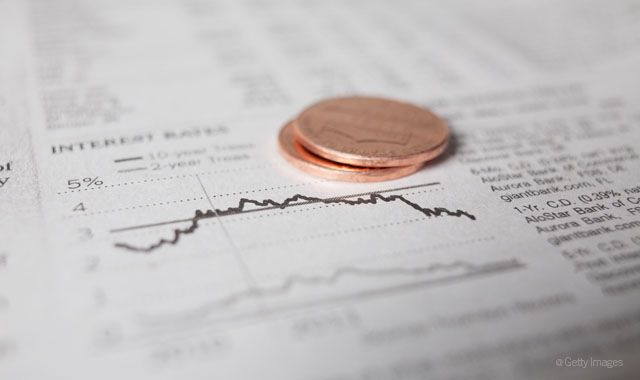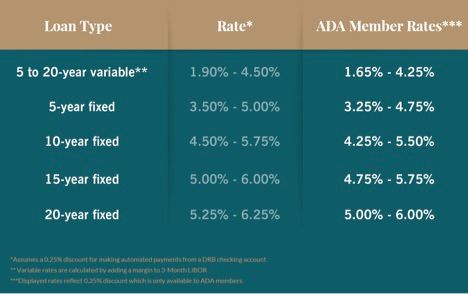ADA announces student loan refinance option
As of September 10th, 2015 the American Dental Association (ADA) and Darien Rowayton Bank (DRB) agreed to an exclusive arrangement to allow ADA members an opportunity to refinance existing federal and private student loans at a potentially lower interest rate.

As of September 10th, 2015 the American Dental Association (ADA) and Darien Rowayton Bank (DRB) agreed to an exclusive arrangement to allow ADA members an opportunity to refinance existing federal and private student loans at a potentially lower interest rate. To understand why this might be of interest to you, it would be helpful have a brief overview of the recent history of student loans.
Trending article: 7 good reasons to borrow money
Historically, student loan interest rates had a cap interest rate, but when rates fell, the loan rates fell and could be locked in at lower rates. Dentists graduating during the recession of 2000 – 2001 were able to lock in fixed rates through the government at 3.12% and with incentives, even lower.1 Things changed on July 1, 2006 when the federal government fixed the interest rates on student loan debts. For dentists, this meant that federal loans were issued at a fixed rate of 6.8% and graduate plus loans were fixed at 7.9%.1 During the financial crisis of 2008-2009, the fed cut interest rates dramatically, but with the new loan rules, student loan interest rates remained fixed and did not decrease.
Trending article: What $10,000 could do for your practice
Over the last few years, a number of private companies have begun taking advantage of today’s lower rates and offering to consolidate student loans at rates lower than the current fixed rate offered by the federal government. One option getting attention recently that can potentially benefit dentists is the exclusive agreement between the ADA and DRB.

Continue to page two for more...
The key points of this agreement are:
· ADA members qualify for a .25% rate reduction as a membership benefit.
· Variable interest rates start at 1.9% on a five year loan, but can rise as interest rates rise. The five and ten year terms have a cap rate of 9%. The 15 and 20 year terms have a cap rate of 10%. So you need to be careful with variable rates.
Trending article: 4 ways to innovate your dental practice without breaking the bank
· Fixed rates start at 3.5% for a five year loan with ten year loans having a rate range of 4.5% - 5.75%. Fifteen year rates range from 5% to 6% while twenty year rates are from 5.25% to 6.25%. The above chart shows that as an ADA member your actual rate will be .25% lower than the normal stated rates above.
· A FICO score of 680 or better is generally required to qualify for the program. Your FICO score, debt, and income all play a role in determining your interest rate. The higher your FICO score, lower your debt, and higher your income, the lower your rate will be on the ranges noted above. The lower your FICO score, higher your debt, and lower your income, the higher your rate will be within the range.
· There are no closing costs, application fees, or pre-payment penalties.
Trending article: HR Hot Topics: Can you send your dental employees home without pay
· To match the federal loan programs, loans consolidated at DRB are now forgivable at death, provided you have not co-signed them with anyone.
· Previous consolidation programs did not allow you to reduce payments if you chose to go back into a residency. The new program, however, does allow dental residents in endodontics, oral Surgery, orthodontics, pediatrics, periodontics, and prosthodontics to refinance their student loans to potentially lower rates while paying only $100 per month during training plus six months beyond the conclusion of residency. The interest accrued during training does not capitalize until the borrower begins their standard term repayment. The borrower must begin their standard repayment term within six months of the end of training.
Continue to page three for more...
· Federal and private student loans are eligible for these programs.
· You must be a US citizen or permanent resident to apply.
· There is no limit on the amount that can be refinanced, but the minimum is $5000. So far DRB has refinanced just over $1 billion dollars in student loans.2
Trending article: 4 ways to create the best experience for your dental patients
There are a couple of drawbacks to this agreement. If you are working, or plan to work in an underserved area or program that qualifies for the Public Service Loan Forgiveness Program, your loans are no longer considered federal student loans and will not eligible for forgiveness. In addition, most servicers of federal loans reduce your rate by .25% if you automate your payment and some give you a rate reduction of another 1% after making on time payments for a specified length of time. You need to make sure you are aware of any incentives your current lender might offer before making any changes.
Below is an example of payments given the current $247,000 average loan debt for a recent dental graduate with a 10 year repayment plan.
Current average rate at 6.8% - 10 year repayment = $2801 per month
Potential Rate with DRB at 4.75% - 10 year repayment = $2567 per month
Alternate Rate with DRB at 5.75% - 10 year repayment = $2675 per month
Trending article: 5 ways to front office excellence in your dental practice
This new announcement can be beneficial for dentists with large amounts of post 2006 student loans. In light of the recent changes, it makes sense to review your options as many will find that they will be able to reduce their student loan interest rates and payments. Below are a few links that can provide more information.
1 "Direct Loans-Calculators and Interest Rates." Direct Loans-Calculators and Interest Rates. Department of Education, 6 July 2015. Web. 30 Sept. 2015.
2 "American Dental Association Announces Exclusive Student Loan Refinancing Offer with DRB to Help Members Refinance Their Dental School Loans." Business Wire. American Dental Association, 10 Sept. 2015. Web. 30 Sept. 2015.